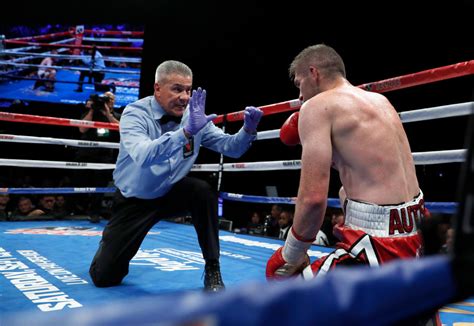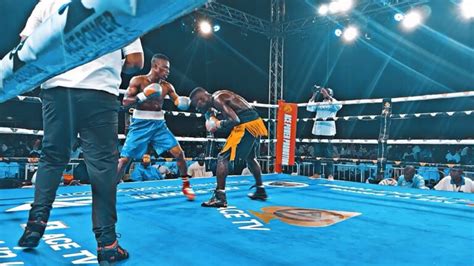Explore the crucial role of referees in boxing, their key duties, ensuring fighter safety, fairness, and responsibilities before and after matches.Referees play a critical role in the sport of boxing, serving as the guardians of safety, fairness, and integrity within the ring. Their duties extend far beyond merely enforcing the rules; they are essential in maintaining the well-being of fighters and ensuring that each bout unfolds according to established regulations. From signaling the beginning of a round to making crucial split-second decisions, referees wield significant influence over the outcome of a match. This article will delve into the multifaceted responsibilities of boxing referees, exploring their key duties during fights, the measures they take to uphold fighter safety, and how they contribute to a fair sporting environment. By understanding the crucial role referees play, fans and aspiring boxers alike can gain deeper insight into this often-overlooked aspect of the sport.
Understanding The Role Of Referees In Boxing Matches
The role of referees in boxing matches is critical, as they act as the guardians of the sport, ensuring it is conducted safely and fairly. Referees are responsible for controlling the match environment, guiding both fighters through the competition, and maintaining adherence to the established rules and regulations.
One of the paramount aspects of a referee’s role is to ensure that both fighters display proper conduct inside the ring. This includes enforcing the rules on illegal strikes, maintaining the fight’s pace, and ensuring that the combatants remain focused on the bout. Moreover, referees must make split-second decisions to determine whether a fighter is able to continue or if the match should be paused for medical assessment.
Another essential element of the role of referees is their influence on the overall outcome of a fight. They are trained to recognize when a fighter is at a disadvantage and can intervene if necessary to protect a fighter from taking excessive damage. This aspect of their responsibilities is crucial to maintaining the integrity of the sport and the health of its participants.
The effectiveness of referees can significantly impact the perception of fairness in boxing, as their decisions shape the dynamics of the match. A skilled referee not only facilitates the bout but also fosters mutual respect between the fighters, fans, and the sport itself.
Key Duties Of Referees During A Boxing Fight
The role of a referee in boxing is critical for maintaining the integrity of the match. During a fight, referees are responsible for several key duties that ensure the bout proceeds safely and fairly. Below are some of the primary responsibilities that referees undertake:
- Ensuring Safety: Referees must monitor the fighters closely for signs of injury or inability to continue. They have the authority to stop the fight at any time if a fighter is at risk.
- Enforcing Rules: Referees enforce the rules of boxing, ensuring that all actions within the ring are compliant. This includes penalizing fighters for illegal moves such as headbutting or hitting below the belt.
- Controlling the Pace: They are tasked with managing the tempo of the match, which includes stopping the fight occasionally for fighter safety or to separate fighters during clinches.
- Counting Knockdowns: If a fighter is knocked down, the referee must count to ten. They carefully assess whether the fighter is fit to continue before allowing the fight to resume.
- Warning Fighters: Referees can issue warnings for unsportsmanlike behavior or repeated infractions, which may lead to point deductions if the behavior continues.
- Communicating with Judges: They must also ensure that judges are informed about the status of the fight, which is essential for scoring purposes. Clear communication helps maintain transparency in the officiating process.
The role of referees extends beyond mere oversight; they are vital for promoting a safe and fair environment during boxing matches. Their decisions can greatly influence the outcome of the fight and the well-being of the athletes involved.
The Role Of Referees In Ensuring Fighter Safety
The The Role of referees in boxing extends beyond merely officiating fights; it encompasses a fundamental responsibility for the safety of the fighters. Referees are tasked with monitoring the bout closely, assessing the conditions under which it is being fought, and taking decisive actions to protect the health and well-being of the boxers.
One of their primary duties is to recognize and respond to signs of distress or danger from the fighters. This includes calling a timeout if a boxer is taking excessive punishment, appears disoriented, or is unable to defend themselves adequately. The referee must have an acute awareness of the fighters’ physical and mental states, making safety judgments in real time as the fight progresses.
Furthermore, referees are responsible for enforcing the rules of boxing that specifically aim to promote fighter safety. This includes prohibiting illegal strikes, managing the distance between boxers, and ensuring a fair playing environment that reduces the risk of injuries. By enforcing these regulations, referees contribute significantly to maintaining the integrity and safety of the sport.
In cases where a boxer is deemed unfit to continue, the referee has the authority to stop the fight, which is an essential function in preventing long-term injuries. Their decision can save a fighter from unnecessary harm and is often guided by a combination of their judgment and the advice of ringside medical personnel.
Overall, the The Role of referees in ensuring fighter safety is paramount. They play a critical role in preserving the health of athletes by making quick and informed decisions that prioritize well-being above all. This not only upholds the standards of boxing but also fosters a safer environment for all participants involved in the sport.
How Referees Contribute To Fairness In Boxing
In boxing, the integrity of the match is crucial, and referees play an essential role in ensuring the role of fairness throughout the contest. Their presence helps maintain a level playing field for both fighters, allowing for a competition that is not just physically demanding but also equitable.
One of the primary ways that referees contribute to fairness is by enforcing the rules of boxing consistently and impartially. They must have a deep understanding of the regulations that govern the sport, including what constitutes a legal punch, the appropriate use of clinching, and other tactics that may jeopardize a fair fight. By applying these rules uniformly, referees prevent one fighter from gaining an unfair advantage over the other.
Moreover, referees are tasked with identifying and penalizing fouls effectively. Any illegal actions, such as hitting below the belt or using excessive holding, can disrupt the natural flow of a match and give one boxer an unfair edge. By recognizing these fouls and stopping the fight as necessary, referees help to preserve the integrity of the competition and ensure that each fighter has the opportunity to compete on equal terms.
Referees also maintain control over the pace of the fight, which is vital for ensuring fairness. If a fighter is constantly using dirty tactics or attempting to evade the rules, the referee has the authority to intervene, issuing warnings or even disqualifying a fighter if behaviors continue. This proactive approach encourages respectful conduct and sportsmanship within the ring, ultimately supporting a fair bout.
The contributions of referees to fairness in boxing cannot be overstated. Their adherence to the rules, ability to identify fouls, and control over the fight dynamics allow for a genuine competition that respects the skills and efforts of both athletes involved. Through these actions, referees truly fulfill the role they are entrusted with in the world of boxing.
The Responsibilities Of Referees Before And After Fights
Referees play a vital role in boxing, extending their responsibilities beyond just officiating the fight itself. Before the match, referees are tasked with ensuring that all regulations are met to maintain the integrity of the sport. This includes conducting pre-fight checks on the fighters, verifying their eligibility, and ensuring that they have completed any required medical examinations. They also confirm that the boxing gloves, equipment, and the ring are up to the standard set by the sanctioning body.
Additionally, the role of referees involves a thorough briefing with both fighters and their corners. This meeting provides an opportunity to explain the rules, outline expectations, and discuss any specifics about the bout that need to be clarified. By doing this, referees foster a mutual understanding that helps in mitigating potential disputes during the fight.
After the fight, referees have important responsibilities to uphold as well. They must document the fight results, noting any significant events, such as knockdowns or disqualifications, in their official report. This documentation is crucial for maintaining accurate records and for any necessary follow-up actions, including potential review or appeals of the fight’s outcome.
Moreover, referees may also be involved in post-fight interviews, where they might be asked about their decisions or observations during the bout. This transparency is vital in promoting trust in the officiating process and ensuring that the fighters, fans, and stakeholders understand the rationale behind certain decisions. Thus, the responsibility of referees extends to maintaining a fair and safe environment both before the fight begins and after it concludes.
Frequently Asked Questions
What is the primary role of a referee in boxing?
The primary role of a referee in boxing is to ensure the safety of the fighters, enforce the rules of the match, and maintain order in the ring.
How does a referee ensure fighter safety during a match?
A referee ensures fighter safety by closely monitoring the action, intervening when necessary, and stopping the fight if a boxer is deemed unable to continue or is at risk of serious injury.
What specific rules does a referee enforce during a boxing match?
A referee enforces rules regarding illegal blows, holding, clinching, and other infractions, as well as ensuring that fighters adhere to the agreed-upon weight classes and conduct.
What are the referee’s responsibilities before the boxing match starts?
Before a boxing match starts, the referee’s responsibilities include checking the equipment, briefing the fighters on the rules, ensuring that both fighters are fit to compete, and conducting a pre-fight weigh-in.
Can a referee stop a match at any time?
Yes, a referee can stop a boxing match at any time if they believe that a fighter is in danger, unable to defend themselves, or not complying with the rules of the sport.
What happens if a referee makes an incorrect call during a match?
If a referee makes an incorrect call, it can lead to controversy and dissatisfaction among fans and fighters, but the decision is final unless there is a clear and undeniable error that warrants review.
How do referees communicate with the judges and ringside officials during a boxing match?
Referees communicate with the judges and ringside officials through hand signals, verbal cues, and by notifying them of any issues that arise during the fight, ensuring everyone is aligned on the match’s proceedings.









